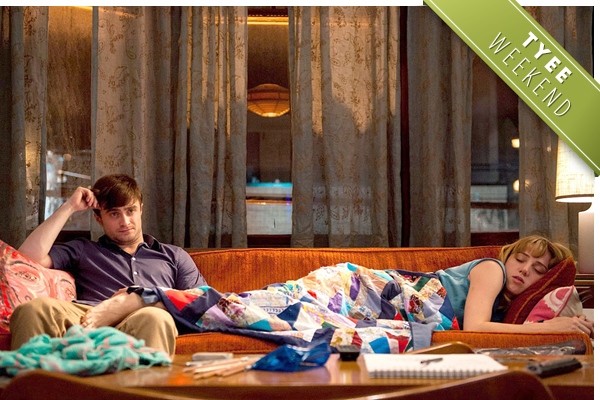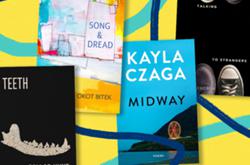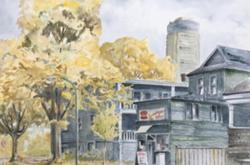Everyone knows that love makes you crazy. But I'm here to tell you that it actually does make you crazy, neurologically speaking.
A recent documentary called Sleepless in New York makes this case, backed up with both anecdotal evidence and cold, hard, scientific fact. The film follows a group of folk who responded to an ad from director Christian Frei asking for help with a documentary project. The criteria for inclusion was participants whose hearts had been recently busted and who agreed to be filmed at their very worst. Sleepless is an enlightening film in many different ways. But it also reveals that humans, whether in the throes of newfound bliss or wracked with heartbreak, are pretty much unbearable to be around.
Turns out that all the endless yammering and carrying on by the heartbroken is hardwired deep in the most primitive sections of the human brain. There's no escaping it, and no reason or logic can assail the madness. But the most terrible bit of information in the film comes from anthropologist Helen Fisher, who discovered that the parts of the brain responsible for the initial ecstatic heights of love become even more active after a person is dumped. Ergo all of that craving, obsession and howling need is worse after your loved one has run off and left you behind. States Fisher: "When you get rejected in love you still continue to love this person. In fact, you love them even harder."
Nature is cruel. After I watched the film's protagonists weep, rage, stalk, obsess and then weep again, I was convinced love is some dangerous shit. But you would hard-pressed to derive this fact from recent movies about love.
Entrails of love
Information gleaned from Sleepless ran through my head while watching Michael Dowse's new film, The F Word. The film is faced with that most insurmountable of challenges, namely: how do you reinvent the rom-com?
The romantic comedy is a film genre that has been declared dead so often that it deserves some type of Golden Lazarus award, perhaps a rotting zombie statuette of embracing corpses sucking each other's faces off. Already this summer, there have been a number of essays and articles, including one on this website, that sort out the entrails of modern cinematic love. Grantland recently devoted an entire week to the form, examining it from every angle. If you want to read something both hilarious and wince-inducing, check out Wesley Morris taking on the rom-com queens from Meg Ryan to Julia Roberts in his article "The Rom-com Hall of Fame."
An erudite friend said the other day that cellphones permanently changed the rocky road to true love. No more missed connections, misunderstandings or failed meetings. Think of poor old Cary Grant waiting for Deborah Kerr on top of the Empire State building in An Affair to Remember, or The Notebook's cache of purloined and hidden letters, or even further back to old Romeo and Juliet not getting the message in time. Just think if they'd each had a cellphone and could send each other sexy texts and avoid tragedy. "Hey beeyotch, just going to pretend to die, so, yeah, don't drink that poison, LOL!"
All to say that maybe things are too easy today, or maybe the stakes are just a whole lot lower. But even that doesn't quite explain the limpness of modern cinematic romance. Formulaic, soppy, trite, take your pick of terms. What is missing is a suitable impediment. Maybe it's because Kate Bush songs are everywhere at the moment ("Wuthering Heights" has been clanging away in my head for days now), or maybe it's the clips of the new version of Miss Julie, directed by Liv Ullman and starring Colin Farrell and Jessica Chastain. Romantic love needs a barrier, and with class, race and social standing no longer as impenetrable as they once were, what's left?
Will they? Won't they?
That is essentially the problem of The F Word, which is forced to contend with the fundamental issue of why shouldn't these two people be together? But I have an even more fundamental question, which is why should we care if these two people get together?
The two in question are Wallace (Daniel Radcliffe) and Chantry (Zoe Kazan). He's a medical school dropout and she's an animator. They are witty, sincere, kind, generous people who are also easy on the eyes. They are so pleasant and good that you could fall asleep watching them stroll about, bantering gently, sipping coffee, all against the glimmering gilded backdrop of summertime Toronto. The only reason Wallace and Chantry aren't together is that she already has a perfectly serviceable boyfriend named Ben.
The two central characters are from what my sister likes to call "The Gilmore Girls Generation," smartly self-conscious youngsters who talk and talk and talk 'till you want to bang their heads together to get a little peace and quiet. Wallace and Chantry meet in good rom-com style at a party making fridge magnet poetry. I'll spare you the endless "Will they? Won't they?" In most rom-coms, things work out just fine. That's essentially the point of the genre itself, to present a couple that belongs together and then keep them apart for myriad reasons until the appointed moment, when the delayed gratification pays off gang-busters. Hello, nurse!
The film makes the case that the only reason these two aren't tripping the light fantastic already is that they're simply too moral. Chantry can't be with Wallace because that would make her a jerk for breaking up with Ben. A more boring conceit is hard to imagine, but director Michael Dowse does what he can with the material. The side players here are much more interesting, including Wallace's best friend Allan, a ruthless horny toad (played by everyone's favourite tall drink of fruit juice Adam Driver), who gets all the best lines and the girl. Allan meets his future love Nicole (played by Laura Dern look-a-like Mackenzie Davis) at the same party where Chantry and Ben first clap eyes. But unlike the first couple, Allan and Nicole make no bones about how nitty gritty dirt band love can be.
Unfortunately, they're side players who show up, suck face and then fade away to make room for the milquetoast leads, who are too cute and short to be of much interest. There's nothing to spark a conflagration, nothing at stake. No one is going to have a terrible life if Wallace and Chantry don't get together. Still, we're dutifully marched through the set pieces, including a nudie swim on the beach where if you squint you can just make out Harry Potter's quidditch sack, then some running through airports, and finally a last minute confrontation that resolves with a spiralling camera and enough cuteness to choke Elvis Presley.
Still, it's hard to begrudge Wallace and Chantry their modicum of happiness, and the overall amiability of the film is charming enough. Sure, it lacks the genuine gonzo weirdness of Dowse's earlier work, Goon, It's All Gone Pete Tong, and of course the mighty FUBAR, but The F Word is a damn sight better than most of the romances out there. Even the briefest perusal of Netflix could convince anyone that love has seen better days. Millennial romances like Drinking Buddies or 500 Days of Summer (perhaps one of the most putrid romances ever committed to celluloid) replace screwball fizz with twee homebrew, but it's flat, thin and burp-inducing.
I like things a bit more bubbling.
Ones I loved
Perhaps it's the things you see while coming of age that shape your romantic fate. In which case, I'm boned.
As children, my sister and I were obsessed with The Quiet Man. If you've never seen this film I envy you watching it for the first time. John Ford's 1952 love letter to Irish blarney features John Wayne and Maureen O'Hara at her most fiery. The plot concerns the story of Sean Thorton, a heavyweight boxer who accidentally kills a man in the ring and returns home to his ancestral Irish village to forget his troubles. In the tiny village of Innisfree he meets and falls in love with Mary Kate Danaher, a redheaded tornado of a woman possessed of ferocious pride and a temper to match. Despite numerous obstacles, including her bullying brother, a missing dowry and weird Irish customs, the pair manage to get married. It's then that all holy hell breaks loose. The scene that sent us wee pervy children into raptures of delight was the one where Mary Kate Danaher stages an escape attempt and is captured mid-flight by her husband. She is dragged, over hill and dale, across the emerald countryside back to her brother's house. I hesitate to examine this too long lest it get all 50 Shades of Green on your ass, but there's no denying the weird erotic power of the thing.
That same capering sense of manic glee attends The Philadelphia Story, Adam's Rib and His Girl Friday. This selection of classic screwballs feature central characters that are meant for each other, but are also charismatic individuals on their own. It is the conflict with a thin layer of danger that ignites the proceedings. Again, critic Wesley Morris gets it exactly right when he writes: "Once upon a time, women in successful romantic comedies were warriors battling men. They fought for love, parity and respect -- to be taken seriously while wearing unserious hats."
His point is the thing that made romantic comedies sing was the struggle, the fight, men and women duking it out, sometimes literally (see Spencer Tracy smack Katharine Hepburn hard on the ass in Adam's Rib and try not to fall head over heels in love with both of them). It is hard to pinpoint the things that set off the fireworks in your head, but when you see them there's absolutely no doubt.
Good stuff is thin on the ground at the moment, which is why we return over and over again to Heathcliff and Cathy, Rochester and Jane Eyre, even Steven Soderbergh's Out of Sight, with two of the most physically blessed humans on the planet (George Clooney and Jennifer Lopez) eyeballing each other's assets. The last time a bit of romantic drama had me yelling like a madwoman at the screen was Sally Hawkins running down Bath's cobblestone streets in the 2007 version of Persuasion. Austen's last novel before she dropped dead at 41, Persuasion is all Austen. Thwarted love, horrid family, missed communication, failed understandings and then after all that, somehow happiness. The shit still works.
It's curious that we humans are designed for pain in so many different ways, and the fact that love lost only makes you love all the more is oddly beautiful. Trapped inside our skin suits and longing for connection, it's the only thing we have. So, in the name of all that is good, let's throw down the gauntlet and go looking for the things that most inspire us, that we love, that drive us mad with joy and have us haunting people's windows, running o'er the moor, hearing voices, spinning in circles, setting things on fire. I'm going on a quest, looking for love in all the wrong places, starting in the movie theatre. I'll send you a postcard. ![]()
Read more: Film
















Tyee Commenting Guidelines
Comments that violate guidelines risk being deleted, and violations may result in a temporary or permanent user ban. Maintain the spirit of good conversation to stay in the discussion.
*Please note The Tyee is not a forum for spreading misinformation about COVID-19, denying its existence or minimizing its risk to public health.
Do:
Do not: